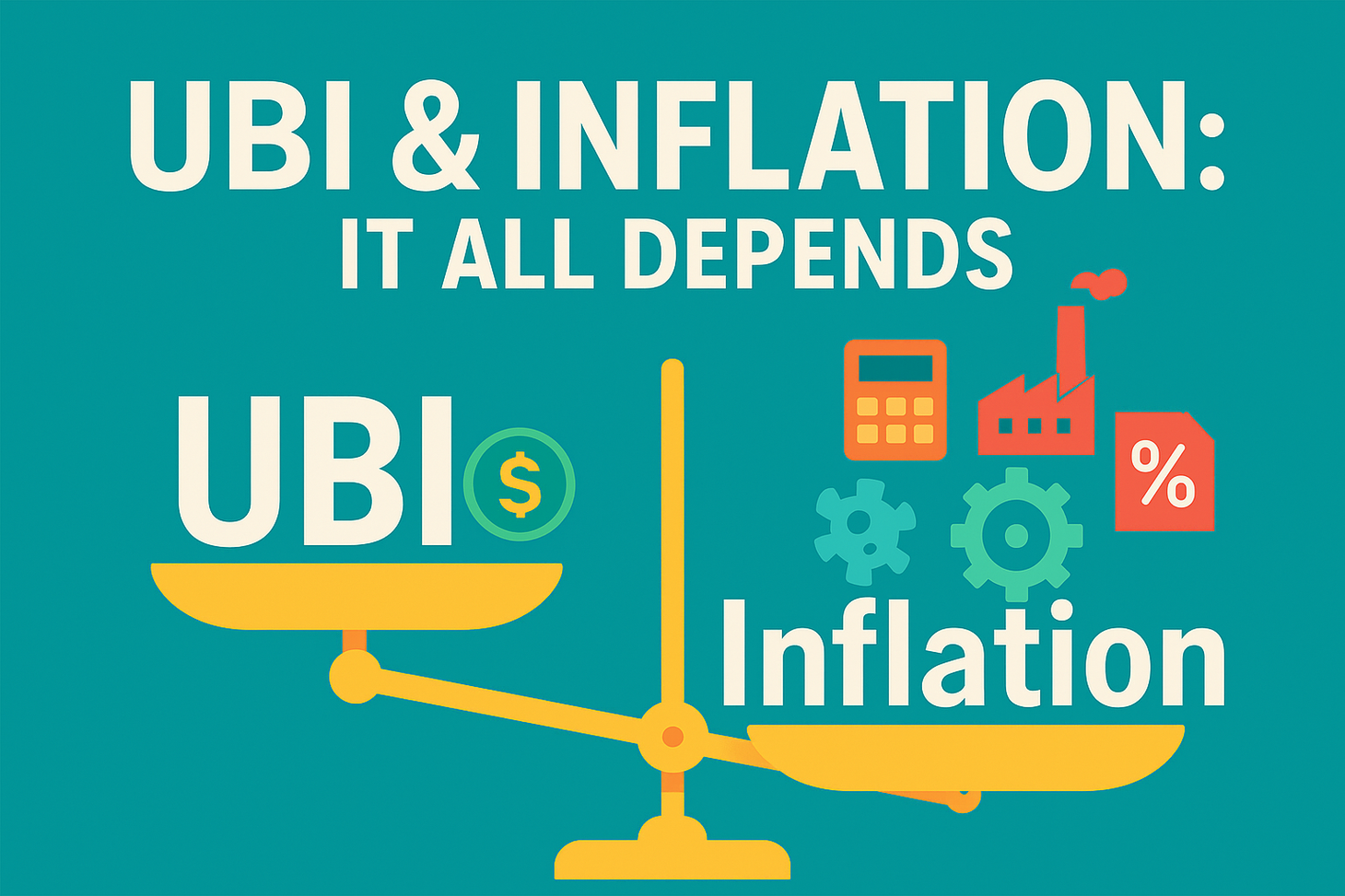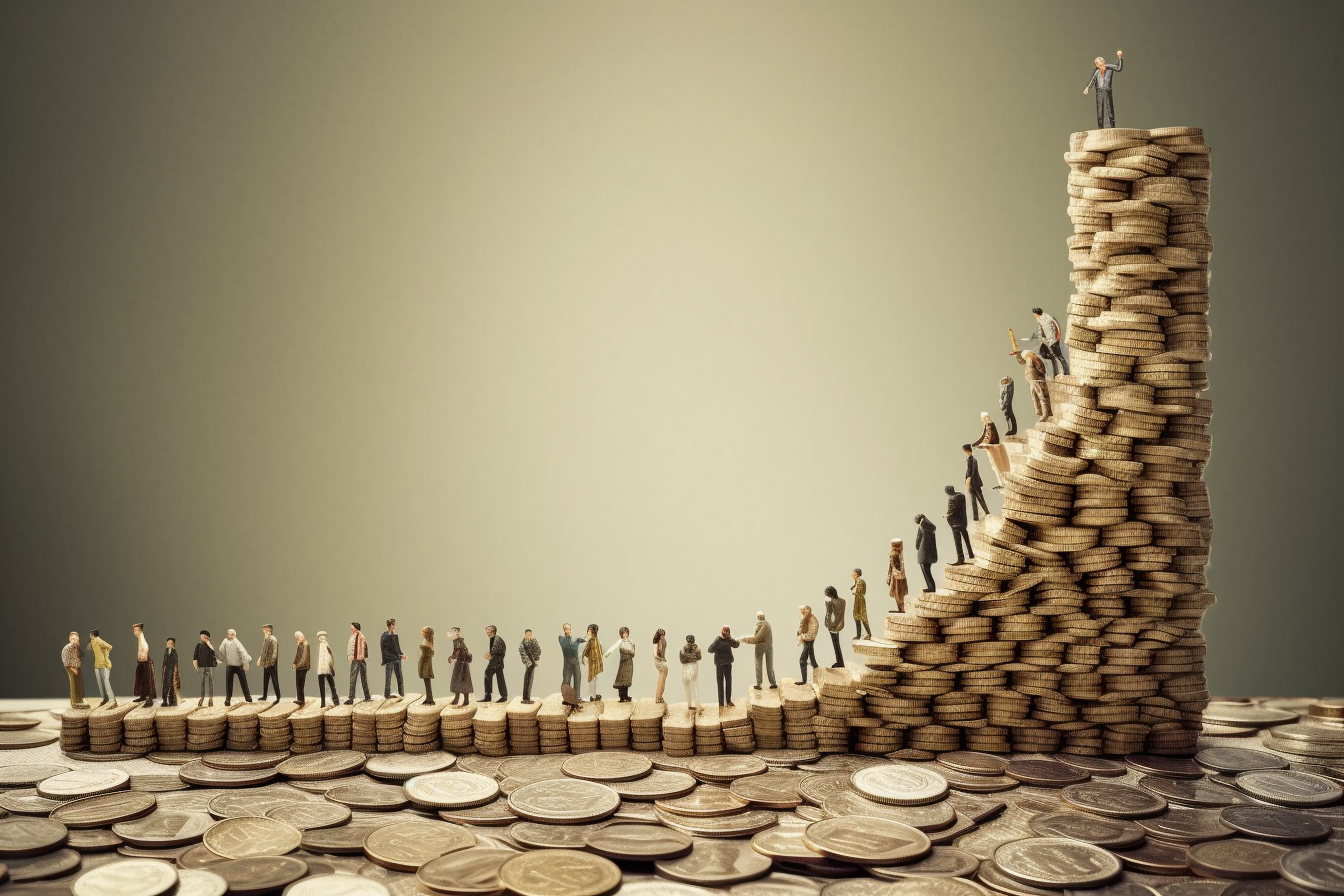17 Key Variables That Determine UBI’s Inflationary Impact

Will universal basic income cause inflation? Will the prices of everything rise? I get asked that all the time. Here's the deal about UBI and inflation: it all depends.
Can UBI be inflationary? Sure, if we do it in a certain way in a certain context, but no, not in other ways and contexts. We're talking about a multivariate equation. So what are the many variables?
Inflation Variable 1: The Amount of UBI
A $100/mo UBI is going to have a different inflationary impact than $10,000/mo. The amount of UBI matters. It matters because of demand exceeding supply, but also the labor impact that can potentially reduce supply. The higher the UBI, the greater the impact on employment.
A poverty level UBI of $1,300/mo has low-to-medium inflation risk depending on other variables. A sub-poverty level UBI of $500/mo has very little inflation risk.
Inflation Variable 2: Economic Capacity
Inflation can happen when the demand for goods and services exceeds the ability to meet that demand with supply. If a country is at or over its capacity, UBI can raise prices. If there's lots of capacity, supply can meet demand. No problem.
In a macro-level experiment in Kenya, the economy entirely absorbed the increase in demand with no inflation because there was so much slack waiting for demand.
Inflation Variable 3: Competition
Even if there's plenty of spare capacity, it's possible for prices to rise with UBI due to monopolistic actors. Price collusion is a problem. Policies that protect and enhance market competition are thus important for successful UBI implementation. This means anti-trust enforcement is important, as is reducing barriers to entry for new businesses.
A big part of the inflation in 2022 was due to supply chain issues causing price increases which businesses then used as cover for additional price increases for excess profits. If only a few companies were providing supply, it was easy to do. According to economist Isabella Weber's analysis of about 140,000 corporate earnings calls, the pandemic supply shocks "functioned as an implicit coordination mechanism for firms to hike prices."
Inflation Variable 4: Time
It is possible for UBI to spark temporary inflation. Prices can go up, signaling suppliers to grow supply. The result can be much greater supply, followed by even lower prices due to abundance. So inflation can come and go. Markets evolve and adapt. I would argue that this kind of inflation is a good result of UBI. An economy should be able to meet true demand for basic goods and services. If UBI causes the price of food to go up purely because there isn't enough food being made, then clearly more food needs to be made so that everyone can eat.
In the India UBI pilot, prices actually went down over time due to a large supply increase in response to increased demand.
Inflation Variable 5: Banks
In a fiat system where a nation like the US issues its own currency, the money supply is ultimately created by federal spending, but within that system, banks also create new money out of debt.
This is how interest rates impact inflation. When the interest rate is high, debt is expensive, so the bank part of the money supply contracts, and when the rate is low, debt is cheap, so the bank part of the money supply expands.
A UBI paired with reducing the ability of banks to expand the money supply would mean no net increase in the money supply by banks. This is a non-tax method of "paying for" UBI. If we started issuing $200 billion a month into the money supply as UBI and simultaneously reduced the issuance of $200 billion a month in credit by banks, the net increase in the money supply would be zero.
Inflation Variable 6: Taxes
Taxes are what delete money from the money supply. Deficits are the difference between created money and deleted money. A deficit-financed UBI is going to have more inflationary pressure than a deficit-neutral one.
Taxing $1 trillion out of the money supply via a land value tax is also going to have a different impact on inflation than a tax reform that removes $1 trillion from the money supply by some other way. Different taxes have different impacts on prices.
Because the top 10% of the population in the US now consumes 50% of all goods and services, besides taxing land value, I think optimal tax reform would involve a mix of new brackets and higher taxes on the top 10%, along with carbon taxes and other Pigovian taxes, a small standard VAT paired with a luxury VAT, a tiny tax on all transactions, and a wealth tax on multi-millionaires and billionaires.
Inflation Variable 7: Welfare Reform
If someone buys food with cash instead of SNAP, demand hasn't increased. So a UBI that replaces existing programs like SNAP, TANF, and WIC will be less inflationary than one that doesn't replace those programs.
Tax subsidies are welfare too. The standard deduction has inflationary pressure. Replacing the standard deduction with a UBI of about $450/mo would impose very little inflationary pressure. Because it would replace a benefit that varies between about $250/mo to $650/mo depending on income quintile.
Inflation Variable 8: Supply-Side Policies
Lots of people worry about UBI and rent. UBI in an area where people can only build single-family homes is going to be more inflationary than in an area that allows multi-family homes and big apartment buildings.
The easier it is to build new housing, the harder it is for landlords to raise rents.
Be smart. Be YIMBY.
Inflation Variable 9: Downstream Savings
UBI has been observed to reduce crime and improve health. When spending goes down on those, that's counter-inflationary. Crime increases prices. More people needing emergency healthcare increases the cost of health insurance.
In the Dauphin saturation pilot, overall crime decreased by 15%, violent crime dropped by 37%, and emergency hospitalization rates decreased by 9%. The overall cost of crime in the US has been estimated at potentially exceeding $4 trillion a year. We spend over $5 trillion a year on healthcare.
The greater the impact UBI has on these massive costs, the less inflationary it is.
Inflation Variable 10: Net vs. Gross
Yes, everyone gets UBI, but that doesn't mean everyone sees a boost after taxes. If you get $15k in UBI and your taxes go up $7k, your net receipt is $8k. Any inflationary pressure would then depend on that net boost of $8k, not the gross receipt of $15k.
If you're getting $15k in UBI and your taxes go up $20k because your taxable income is $200k, then your disposable income goes down $5k. You'd have $5k less to spend despite the $15k UBI.
For the same reason a UBI is cheaper than most people think, it's also less inflationary than most people think.
Inflation Variable 11: Inferior Goods
When people get more money, that can mean buying one pair of nice boots that last for 30 years instead of one new pair of cheap shoes each year. What economists call inferior goods like this should be taken into consideration.
Demand for certain goods will go down because people have more money to spend. People buying less stuff is deflationary, not inflationary.
Inflation Variable 12: Savings and Debt
We know from pilot experiments and also the annual Alaska dividend that people provided UBI spend a percentage of it paying off their debts and building up their savings.
When it's more attractive to save money instead of spend it, that reduces inflation. Not all UBI will be spent. Some percentage of UBI will be saved for the future. What is saved has no inflationary pressure.
When people spend their money paying off their debts, not only are they not buying goods and services, but that kind of spending shrinks the money supply. It's deflationary, not inflationary.
So if someone gets a $1500 UBI payment and they then save $500 of it and put $500 towards their credit card, and spend the remaining $500 on stuff, then only $500 has any potential inflationary pressure, and that could be entirely balanced by the $500 they eliminate from the money supply with their credit card payment.
Inflation Variable 13: Money Velocity
A dollar at the bottom of the economy tends to be exchanged more than one at the top. This is known as the marginal propensity to consume and it's part of the overall velocity of money. A tax cut for the top 1% is less inflationary than an equivalent tax cut for the bottom 60% because the rich don't stimulate local economies as much with their spending. They may even just hide it offshore.
If an economy has a money velocity that is at record lows, a UBI is going to be less inflationary than if the money velocity were at record highs, so that matters.
But UBI will also grow economies more, locally and nationally. A single dollar in the hands of the working class will be spent over and over again in local businesses and that will have a larger impact on GDP than spending by the rich.
An expanding economy is going to be able to handle more future spending without inflation than an economy that is stagnant and demand-starved.
It could be argued that we would have seen less inflation as a result of the pandemic if decades of relatively stagnant wages hadn't suppressed GDP growth.
Inflation Variable 14: Inequality
High inequality can actually cause a special kind of inflation, in which case reducing inequality can reduce the costs of certain goods and services.
An economy oriented around the demands of the rich responds differently than one oriented around the demands of the many. Consider housing as one example. The rich bid up the price of housing, because it's treated like an asset. Less inequality would mean high wealth households owning five houses instead of ten. That increases the available supply of housing, lowering the price.
The rich are also less sensitive to price increases. If the price of eggs go up, they're going to buy eggs no matter the cost. It doesn't matter to them. In order for the price of things to go down, people have to buy less of it.
Some stuff only costs as much as it does in the US because inequality is so high. Reducing inequality would lower the costs of various goods and services. That would be a counter-inflationary force.
Inflation Variable 15: Unpaid Work
If two parents were to stop paying each other for child care to watch each other's kids, both parents would have less money but be happier doing that work without pay. In this way, unpaid care work is effectively subsidizing paid care work.
UBI could reduce the cost of child care if fewer people sought paid child care despite being more able to afford paid child care due to UBI. That would be counter-inflationary. The cost of child care would also likely go down if more people chose to become paid care workers to expand the supply.
Consider the impacts of more people choosing unpaid work in all kinds of work as a result of UBI. The more people choose to work for free, or choose to work for less, the lower the price.
Inflation Variable 16: Disasters
As we saw with the COVID-19 pandemic, a global disaster can have large impacts on supply chains and lead to inflation. The same goes for climate change. Introducing UBI in an area frequently being impacted by climate disasters is going to have different inflationary pressure than in an environment not being impacted.
For this reason, it would be wise to invest in climate resilience and pandemic planning so that supply is more able to respond to UBI demand in areas that experience supply chain impacts.
Inflation Variable 17: Technology
Finally, automation is a deflationary force. As AI advances and robots displace workers, the concern will increasingly be about deflation leading to recession as people are less able to buy what machines are producing. UBI can be seen as a tool to counter this danger by maintaining consumer buying power. In this regard, the potential inflationary effect of UBI would actually be a good thing.
I'm sure I'm missing even more variables, but hopefully you now understand that inflation depends on a lot of variables. It's a multivariate equation.
Basically, it's oversimplifying to say that basic income will cause inflation. It all depends. Every country considering it has different choices to make.
If you support my UBI work, please share this post and click the subscribe button. Also consider making a monthly pledge in support of my work.

Special thanks to my monthly supporters on Patreon: Gisele Huff, Haroon Mokhtarzada, Steven Grimm, Judith Bliss, Lowell Aronoff, Jessica Chew, Katie Moussouris, David Ruark, Tricia Garrett, A.W.R., Daryl Smith, Larry Cohen, John Steinberger, Philip Rosedale, Liya Brook, Frederick Weber, Laurel gillespie, Dylan Hirsch-Shell, Tom Cooper, Robert Collins, Joanna Zarach, Mgmguy, Daragh Ward, Albert Wenger, Andrew Yang, Peter T Knight, Michael Finney, David Ihnen, Steve Roth, Miki Phagan, Walter Schaerer, Elizabeth Corker, Albert, Daniel Brockman, Natalie Foster, Joe Ballou, Arjun, Justin Dart, Felix Ling, S, Jocelyn Hockings, Mark Donovan, Jason Clark, Chuck Cordes, Mark Broadgate, Leslie Kausch, Braden Ferrin, Juro Antal, Austin, Deanna McHugh, Stephen Castro-Starkey, and all my other patrons for their support.
UBI Guide Newsletter
Join the newsletter to receive the latest updates in your inbox.



